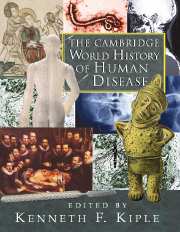Book contents
- Frontmatter
- Introduction
- Part I Medicine and Disease: An Overview
- Part II Changing Concepts of Health and Disease
- II.1 Concepts of Disease in the West
- II.2 Concepts of Disease in East Asia
- II.3 Concepts of Mental Illness in the West
- II.4 Sexual Deviance as a Disease
- II.5 Concepts of Heart-Related Diseases
- II.6 Concepts of Cancer
- Part III Medical Specialties and Disease Prevention
- Part IV Measuring Health
- Part V The History of Human Disease in the World Outside Asia
- Part VI The History of Human Disease in Asia
- Part VII The Geography of Human Disease
- Part VIII Major Human Diseases Past and Present
- Indexes
- References
II.3 - Concepts of Mental Illness in the West
from Part II - Changing Concepts of Health and Disease
Published online by Cambridge University Press: 28 March 2008
- Frontmatter
- Introduction
- Part I Medicine and Disease: An Overview
- Part II Changing Concepts of Health and Disease
- II.1 Concepts of Disease in the West
- II.2 Concepts of Disease in East Asia
- II.3 Concepts of Mental Illness in the West
- II.4 Sexual Deviance as a Disease
- II.5 Concepts of Heart-Related Diseases
- II.6 Concepts of Cancer
- Part III Medical Specialties and Disease Prevention
- Part IV Measuring Health
- Part V The History of Human Disease in the World Outside Asia
- Part VI The History of Human Disease in Asia
- Part VII The Geography of Human Disease
- Part VIII Major Human Diseases Past and Present
- Indexes
- References
Summary
Mental disease refers, at present, to disorders of perception, cognition, emotion, and behavior. The disorder may be mild or severe, acute or chronic, and may be attributed to a defect of mind or body or of some unknown combination of the two. A diagnosis of mental illness is the judgment that an individual is impaired in his or her capacity to think, feel, or relate to others. In mild cases, the impairment may intrude on a person’s ability to gain satisfaction from meeting the challenges of everyday life. In severe instances, an individual may be thought so dangerous or incompetent that sequestration within a psychiatric facility is necessary, with a resulting loss of rights normally granted to citizens.
The Problem of Mental Illness
The simple title of this section belies the extraordinary scope, complexity, and controversial state of contemporary psychiatric thought. Some have argued that if the myriad types of disorders bedeviling humankind were ranked by the net misery and incapacitation they caused, we would discover that psychiatry captures a larger share of human morbidity than does any other medical specialty. It seems ironic - if not tragic - that a clinical field of such magnitude is at the same time distinguished among its peers by a conspicuous lack of therapeutic and philosophical consensus. That the discipline lacks a set of internal standards by which to differentiate unequivocally the correct theory from the false, or the efficacious therapy from the useless, is an open secret.
- Type
- Chapter
- Information
- The Cambridge World History of Human Disease , pp. 59 - 85Publisher: Cambridge University PressPrint publication year: 1993
References
- 5
- Cited by



